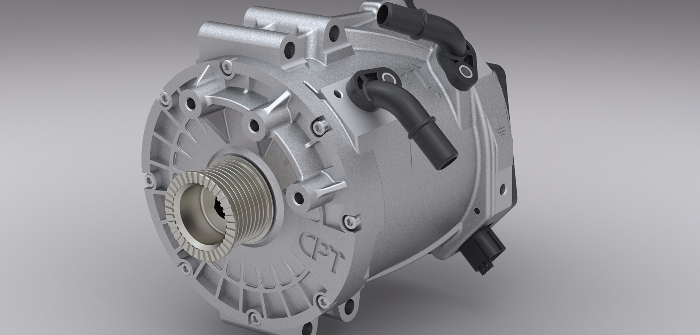A joint study by Controlled Power Technologies (CPT) and Austria’s Technische Universität Wien (TU Wien) into 48V mild hybrid technology, which the automotive industry can cost-effectively incorporate as original equipment into low voltage electrified powertrains, has demonstrated the potential of fast-acting starter-generators for reducing the residual NOx emissions of the latest Euro 6 diesel engines.
The cooperative study, by one of the UK’s leading 48V specialists and one of the most successful technical universities in Europe, verified a 9% reduction of this troublesome air pollutant in raw engine-out emissions, while retaining the fuel economy and CO2 benefits of diesel engine technology. The cost effectiveness of this approach is further underscored by its impact on lean NOx trap (LNT) and selective catalytic reduction (SCR) aftertreatment systems, which have less raw NOx emissions to process, potentially allowing for a reduction in exhaust system cost and complexity, and a longer service life.
“The result of our research programme, incorporating e-motor characterisation, simulation and engine emission dynamometer testing was a clear benefit in terms of raw NOx reduction of a premium saloon with a 3-liter V6 engine,” says CPT’s manager responsible for applications engineering and strategic projects Paul Bloore. “The decrease in NOx emissions, moreover, was achieved with a near 5% fuel economy improvement and corresponding CO2 reduction, delivered simultaneously by the SpeedStart starter-generator.”
Belt-integrated starter-generator (BISG) systems have already been successfully applied by the industry to reduce CO2 emissions by the simple expedient of stop- start. In principle, the same low voltage technology can be used to modify the load on the engine and optimise its performance for minimal NOx and particulate emissions. The challenge is having a fast-enough response time for real world driving conditions. CPT’s switched reluctance technology is by its very nature fast acting as well as being highly controllable, and well suited to optimising diesel and petrol engines for minimal NOx and particulate emissions.
Not only does lower raw emissions of NOx reduce the load on an SCR system, and hence the continuous consumption of ammonia (AdBlue) used as the reducing agent, but also has the potential to reduce the active catalytic components, which are usually precious metals. A switched reluctance machine might even allow the use of an LNT solution rather than requiring the more expensive SCR system. Diesel exhaust systems can also include a diesel particulate filter (DPF), which may also require less frequent purging.
“This research shows that the transport sector can further reduce air pollutants without it costing the earth,” explained CPT’s co-founder and chief executive Nick Pascoe. “The cost competitiveness of 48V technology, compared with full hybrid and plug-in solutions, is a critical issue for the automotive industry, and gives it a breathing space while pursuing more affordable fully electric vehicles. The necessary reduction in transient emissions re-focuses the driveline electrification task onto engine mounted ‘P0’ motor-generator configurations.”
“The cost of batteries must reduce significantly before EVs are as cost effective as internal combustion engines running on petrol or diesel, and most pundits do not expect this to be achieved for at least another decade,” added Bloore. “Meanwhile, mild hybrid technology is not only cost efficient, but also adds immediate value when both air quality and carbon emission performance can be optimised without compromising fuel consumption.”
“The affordability of low voltage propulsion systems is equally important to the end-user,” continues Pascoe. “Motorists and transport operators alike, want to be friendly to the environment, but need to be mindful of the current pricing of high voltage electric vehicles.”
The CPT-TUW study evaluated the switched reluctance technology to the Worldwide Harmonised Light Vehicles Test Procedure (WLTP); the latest compliance requirement for any new cars launched onto the EU market from September 2017 onwards. WLTP defines a globally harmonised standard for determining the levels of pollutants and CO2 emissions, as well as fuel or energy consumption.
“Being closer to real world driving conditions, WLTP offers a more dynamic test profile,” said Bloore. “It’s more helpful therefore in demonstrating the ability of an SRM to very rapidly supply torque to the engine, which is delivered to the crankshaft via the front pulley belt system, thereby adapting the level of electric assist to the traffic conditions and style of driving.”
The CPT-TUW study not only considered elements such as the belt ratio, but also the thermal efficiency of the water-cooled BISG, as well as vehicle operational patterns over additional test cycles. The boosting provided by the BISG came only from energy recovered during recuperation events, with a balanced battery state- of-charge and a constant vehicle electrical load applied of 300W.
“It is well understood that real world driving conditions can typically increase the load on an engine with a corresponding increase in exhaust emissions compared with laboratory test cycles,” says Bloore. “The precision and repeatability of laboratory test cycles, however, makes them invaluable for vehicle back-to-back and technology comparisons.”
That said, CPT is further validating its technology over the Real Driving Emissions (RDE) test cycle, which being even more robust should demonstrate the potential for further improvements of its SRMs.
“An SRM offers consistent high power and high efficiency over a wide speed range, and unlike some alternative motor technologies, energy sapping electromagnetic field weakening is not an issue,” says Bloore. “The precise torque control enables a swift response within milliseconds to changes of load on the machine – and that’s one of our unique advantages against other types of electrical machine.”
Like mild-hybrid systems generally, CPT’s SpeedStart technology harvests kinetic energy when the vehicle decelerates, which is then reapplied as torque by the switched reluctance machine during accelerations to offset fuel burn in the combustion engine. The sophisticated electronic control offered by an SRM, however, can further influence the engine operating point by absorbing or supplying electrical energy to move the combustion engine into a more favourable operating region. The benefits are achieved, because an SRM machine can respond swiftly to fast changing and transient road conditions.


